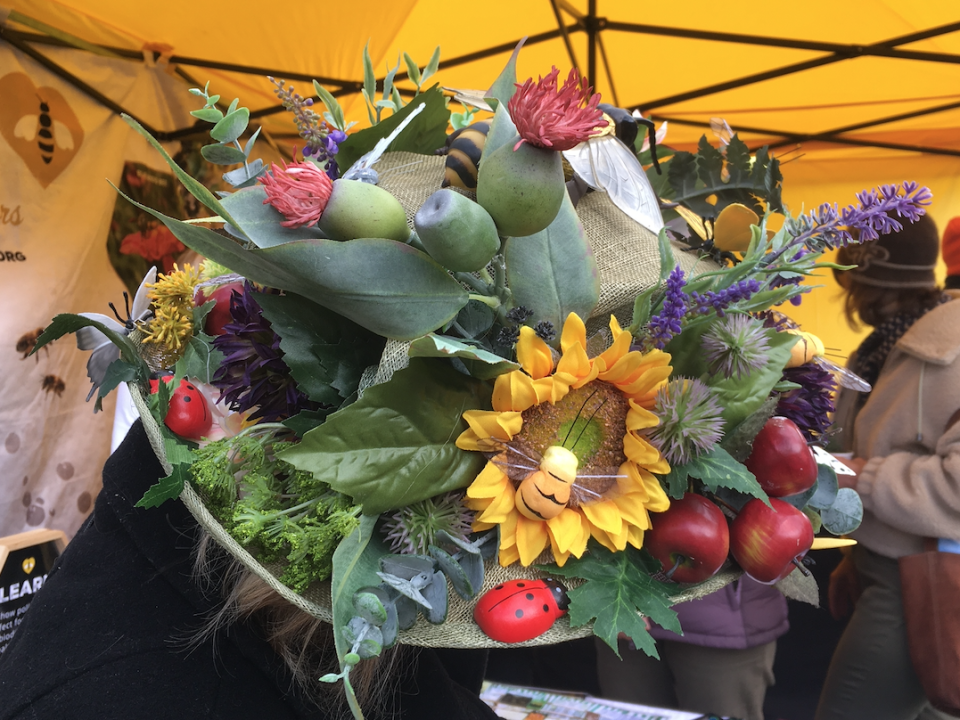Nature Connection helps us all
April 13, 2020ACT For Bees Mid Winter Buzz
July 2, 2020
The last six weeks or so have felt like hibernation for some us with the COVID-19 social distancing rules. But the bees and other pollinators have been feasting on the flowering shrubs and plants in our gardens to build up stores for the winter ahead. From the darkness of winter, new growth emerges. Growth and hope.
In our pollinator world, we have some reasons to hope. More of the mainstream press is focussing on the detrimental effects of harmful pesticides like ‘neonics’ or neonicotinoid pesticides to give them their proper name.
Neonics are harmful because they dissolve in water and are absorbed by plants, making all of the plant — its nectar, pollen, and fruit—toxic to insects. Neonics are often applied as a “drench” to a plant’s roots, or as a coating on a plant’s seed, which the plant then soaks up as it grows. The levels applied can often be so high that they make the plant toxic to insects for years. This is why ACT for Bees has been lobbying hard for the banning of neonics. It is great to see that more people are getting on board. Our website has the brand names of common Australian neonics.
One other reason for hope is that during the lockdown, added importance has been given to open spaces within cities. Besides offering restful and beautiful places to exercise, parks and gardens play an important role in biodiversity. In fact, new research suggests that cities can be a very rich pollinator-friendly environments. You can check out our pollinator friendly planting guide on our website and start planning for spring! Gardening for Bees
You might also like to watch to videos of our very successful workshop in February where a number of experts spoke about ways to promote biodiversity in cities. Bees, Butterflies, Birds: Maximising Biodiversity by Supporting Pollinators
 Waggling for World Bee Day Wednesday May 20th.
Waggling for World Bee Day Wednesday May 20th.
Join the Waggle Dance Challenge, an Australian-led global celebration of bees for World Bee Day!
 The 2020 Global Online Waggle Dance Challenge is an attempt to achieve 20,000 waggle dance videos, from 20+ countries, in 20 days, ending on the 20th May 2020.Each video uploaded is in recognition of the 20,000+ bee species that exist globally.
The 2020 Global Online Waggle Dance Challenge is an attempt to achieve 20,000 waggle dance videos, from 20+ countries, in 20 days, ending on the 20th May 2020.Each video uploaded is in recognition of the 20,000+ bee species that exist globally.
Click here to Waggle for World Bee Day or find out more information and invite others to join in too! We’re out to set a World Record for Waggling to celebrate bees and raise awareness of the important role they play for food security and ecosystem health. We would love to have you help us by dancing and uploading your video version of the waggle dance.
Highlights from the month
Here are a pick of posts from ACT for Bees Facebook page over the past month which may interest you.
- Urban Wildlife App: Beneficial Insects Clean Air and Urban Landscapes (CAUL) Urban Wildlife app lets you help to monitor and conserve native wildlife in Australian cities. You can record sightings of beneficial insects, including bees, butterflies, beetles, bugs and other important insect groups. The data you record about plant-insects interactions will help us to better understand how we can manage beneficial insects so that their populations can persist and co-exist with humans.
- Bermagui on the South coast has recently got new hives after the bushfires. How can burnt trees become a home for wildlife?
- Why bees are finally getting a break . ‘One of the biggest environmental impacts of the global shutdown has been the significant reduction in air pollution. According to a 2016 study, pollutants break down scent molecules emitted by plants making it harder for bees to detect food. This means they have to fly further to find food and bring it back to their nests. Less fumes from cars on the road makes it easier for bees and pollinators to forage.’
- 5 Vital Roles Insects Play in Our Ecosystem. Every buzzing, crawling, and hovering insect is a cog in an ecological machine. Tiny, individual efforts add up to colossal benefits for life on Earth.
Have you see ACT for Bees Education page with a wide range of resources, books for young and old, videos and fun facts about bees?
Bee Hotels?
We’re getting a number of enquiries about building Bee Hotels. If you’re wanting to build a Bee Hotel, there are great ‘How to’ guides on Australian Native Bees page.
Most nesting boxes bought in shops are not deep enough for Australian native bees.
“It’s important to avoid providing nest holes that are too shallow. Solitary above ground nesting bees usually fill cells with female offspring first (deeper in the cavity) before positioning male cells later (as they get closer to the entrance). Artificial cavities that are too short may have the unintended result of creating skewed sex rations of offspring leading to a higher number of females to males. To avoid this, be particularly selective when buying larger diameter drill bits. Get long ones to allow them to drill to 120mm (5mm hole), 150 mm deep (6mm hole) and 150 mm (8mm hole) deep are the most commonly used by local Australian Native bees.” Note also the timber must be not chemically treated and the holes need to be smooth.p61 Australian Native Bees AG Guide NSW Dept Primary Industries.



